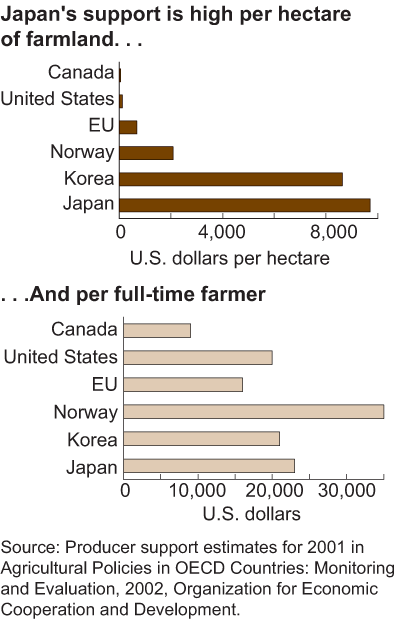Is Japan Ready for Competition in Its Ag Markets?
- by John Dyck
- 2/3/2003
About 40 percent of Japan's food supply is domestically produced by an agricultural sector that receives substantial support from the government. Japan's support—at about $23,000 per full-time farmer and almost $10,000 per hectare of farmland—is among the highest of any country. The Japanese government argues that this support is necessary for the economic, environmental, and cultural well-being of rural areas and for the nation's food security. Critics argue that such support deters other countries from entering Japan's agricultural markets, weakening domestic and international competition and raising prices for Japanese consumers.
Imposing tariffs (taxes) on foreign agricultural products is Japan's major form of support. Removal of these 'border barriers' would significantly reduce consumer food prices in Japan. Measured by the difference between domestic and import prices, border barriers provide as much as $42 billion a year of support to agriculture. Not surprisingly, products that are subject to negligible tariffs comprise a large share of imports. More surprising is that a significant portion of imports arrives despite high tariffs. Production of some commodities is so expensive that imports are profitable even with high tariffs.
Internal policies, such as agricultural subsidies, are the other major form of support. In 1999, Japan's government spent almost $26 billion in taxpayer funds on agriculture. Japan has been abandoning old policies that propped up market prices in favor of policies that compensate farmers when market prices decline and policies that improve marketing channels and farmland. Consumer prices for rice and other foods have been drifting down as government interventions in retail and wholesale marketing have ended. The government also wants to target payments to larger scale, specialized farms to lower costs. Progress in lowering farm costs and consumer prices, however, has been slow.
Reforms in internal farm policies have marginal impact as long as border barriers are high. Current World Trade Organization negotiations on agricultural trade may impose lower limits on border measures and similar policies. Lower limits mean that Japan's agriculture would face more import competition, which would press its farm sector to lower costs by quickly restructuring itself. In theory, the government could compensate farmers for lost farm income by providing income support not linked to farming; however, Japan's high government deficits would make increasing domestic spending difficult. Japan's consumers, and its economy as a whole, stand to benefit from lower food prices—perhaps more so than consumers in any other country. Nevertheless, Japan's resistance to strong trade liberalization in agriculture is based on the realization that its current agricultural structure is not compatible with sharply reduced barriers against imports.
This article is drawn from:
- Agricultural Outlook December 2002. (2002). ERS.


